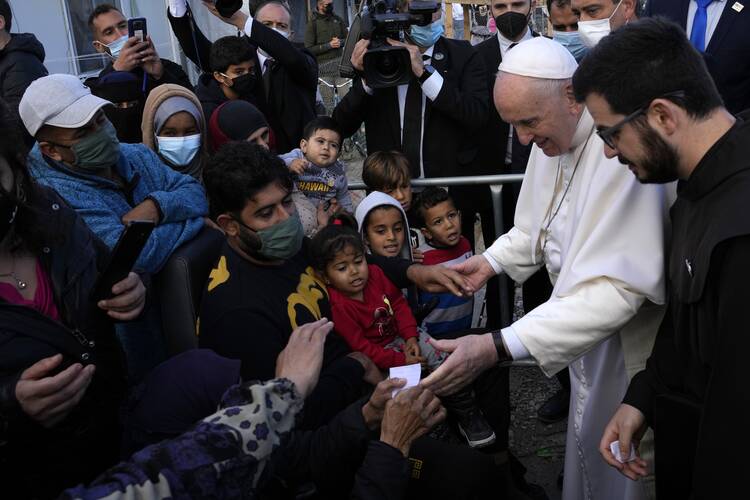A Reflection for the Memorial of Saint Vincent de Paul, Priest
Find today’s readings here.
My grandfather’s name was Vicente. Today would have been his santo, often a more important celebration than one’s birthday in some cultures. It is the day to remember the saint whose name we bear and be inspired by them. To be named after St. Vincent de Paul really fit my abuelo. He was the wise and loving elder whose generosity was boundless.
Vicente. Names are so powerful—saying them, hearing them. The act of naming someone brings about two seemingly opposite experiences: impermanence and remembrance. Saying the name Vicente for my abuelo hurts my heart and reminds me of the last time I saw him as a child. I am there again, in the car speeding away from abuelo’s house as I crane my neck for one last uncomprehending look. We were leaving our country as refugees while my grandparents stayed behind to care for the rest of the family.
“We would see each other soon, yes?”
“Yes,” abuelo reassured me. But what does “soon” mean to a child who doesn’t know about passing time?
“Soon” never came.
I never saw my abuelo again, my children never met him, and the country we fled is still suffering. Like every immigrant, exile and refugee in history, I strain against the force of impermanence, and I do this by evoking remembrance. This is also what we do every time we encounter our Scriptures: We meet again those who are gone and honor them by remembering their wisdom.
Today’s reading from Ezra speaks of a community’s repeated experiences of impermanence caused by war and exile. There must be a reason for all this suffering, isn’t there? How many times do we ask this same question? We humans seek meaning in our experiences. So how are we to understand experiences that could break us? In Ezra’s telling, the search for meaning first takes our biblical ancestors to guilt. There is guilt, but who is guilty? Perhaps at first the victimized turn inward, asking what we have done to deserve this. And then, even more problematically, we ask if this is God’s will. The millions of refugees of the world, with their families torn apart, are not the ones who should bear the guilt. Today’s readings taken together can help us disentangle some of this.
Our ancestors interpret much of their suffering both to be caused by themselves and to be a judgment of God against them. The Scripture says there is the weight of “our wicked deeds…heaped up above our heads and our guilt reach[ing] up to heaven” (Ez 9:6). The pain of the world’s displaced is caused by the cruelty of humans against other humans. There is guilt there, and God’s judgment must indeed be felt. And yet, the Scriptures lift us out of that painful impermanence with the remembrance of God’s mercy. Here the Gospel of Luke helps us disentangle it further. Because there is wickedness, because the innocent suffer and because God is a God of compassion, Jesus sends his friends out—in every generation—to embody God’s mercy. God’s mercy is not theoretical but made incarnate in the midst of life. St. Vincent de Paul knew the call of mercy and dedicated his life to care for the poor and sick. I got to know the response of mercy as I encountered teachers who helped me learn a new language, classmates who welcomed me and government agencies and nonprofits that helped refugees resettle. I still remember with gratitude a charitable organization that provided eyeglasses so my younger sister could see.
Yes, God’s judgment falls on the wicked whose deeds continue to rob the reign of God of its beauty. May they feel that judgment. And God’s mercy flows from Jesus’ very hands right into our own every time we act to lessen suffering. I will never stop grieving the loss of my abuelo, but, in response to God’s mercy, I can make my broken heart productive in remembrance of Vicente. Where is the pain? Jesus send me out; let me bring healing.








